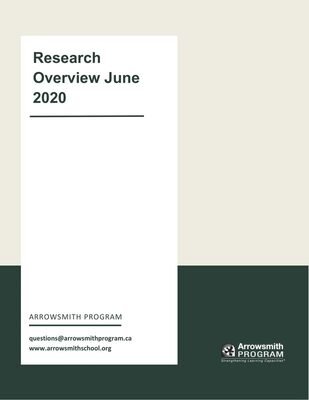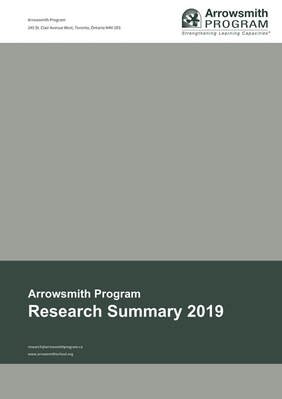Since introducing the Arrowsmith Program to Tasmania in 2022 we have seen amazing changes in peoples lives of varying ages. Learning Difficulties are certainly being overcome, self confidence, cognitive and academic results improved significantly in various areas. The assessment results are outstanding with some detail below from the research undertaken:
Overview
In February 2022, a project was started in collaboration with Teen Challenge, Tasmania, and the Arrowsmith Program. The hypothesis was that the Arrowsmith Symbol Relations Cognitive Program would be of benefit cognitively and academically to the group of school-aged students at Teen Challenge in Tasmania. This population of children have had significant negative impact on their cognition related to trauma, prenatal issues, childhood experiences and substance abuse.
Research Method
For the 2022 study, data was collected over 8 months in 2022 on:
• cognitive abilities on the Woodcock-Johnson IV Tests of Cognitive Abilities
• academic achievement on the Woodcock-Johnson IV Tests of Achievement
• a survey questionnaire of observed changes across a range of dimensions related to the Symbol Relations cognitive function
Group
There were 8 participants, comprised of 3 males and 5 females, with an average age of 13.1 and ranging in age from 8 to 20 years old. They worked on the Symbol Relations cognitive program four hours per week over 8 months. This population of children have had significant negative impact on their cognition related to trauma, prenatal issues, childhood experiences and substance abuse.
Woodcock-Johnson IV Achievement Test Results
The Woodcock-Johnson IV Test of Achievement is an individually administered, norm-referenced instrument that measures specific areas of academic achievement in persons aged 4 to 90.
Over 8 months of working on the Symbol Relations cognitive function, participants showed statistically significant gains on a standardized measure (Woodcock-Johnson IV Test of Achievement) of the following areas of academic achievement:
Woodcock-Johnson IV Achievement Test Results
The Woodcock-Johnson IV Test of Achievement is an individually administered, norm-referenced instrument that measures specific areas of academic achievement in persons aged 4 to 90.
Over 8 months of working on the Symbol Relations cognitive function, participants showed statistically significant gains on a standardized measure (Woodcock-Johnson IV Test of Achievement) of the following areas of academic achievement:
To read the full research paper please click here
Parents/Guardians on the Survey reported:
• Now asks in depth questions
• Vocabulary is much better
• More able to understand and comprehend during a conversation
• Better able to argue a point in a clear and thoughtful way
• School is reporting better behaviour
• Better learning outcomes at school and more settled in class
• Teachers report learning is getting better
• Improved understanding of the work in class
• Changes seen in English, Mathematics, Written Expression
• Spelling is better and essays make more sense
• Now enjoying schoolwork and learning new things
• Getting better grades
• Finds schoolwork easier and requires less help
• More eager and motivated to learn
• Getting work done on time and getting good grades
• Becoming confident to go places without me
• Thinking and strategies have improved
• More settled and able to regulate quicker in most situations
Read a Blog about just one of the young people in our program here in Tasmania and their personal experience with the Arrowsmith Program.
Through the exciting science of neuroplasticity of the brain and its ability to change we believe this is going to help even more young people and adults with learning difficulties or those that want to increase their cognitive abilites to gain the edge in academic and life areas and results are already life changing.
Each individual is different and so approaches to each persons program can be different. Assessments are available to help identify areas that need assistance and then which aspects of the Arrowsmith Program can best fit.
The Arrowsmith Program is based on the application of neuroscientific research and for 40 years we have worked to help students strengthen the weak cognitive capacities underlying a range of learning difficulties. Our goal is to help students become effective, confident, and self-directed learners. For children and youth, this includes enabling them to return to a regular school after a three to four year program. The Arrowsmith program is offered at sites throughout North America, Australia, New Zealand, Asia, Spain, the Cayman Islands, and Switzerland.
Take the next step today
To arrange a confidential discussion today on how the Arrowsmith Program could help you or your loved one please fill in the form below or email: arrowsmith@teenchallengetasmania.org
Top 10 Cognitive Areas We Address
Recognize the Signs…..
Motor Symbol Sequencing (MSS)
Ability to learn and produce a written sequence of symbols.
Students with a difficulty in this cognitive area have problems writing out the alphabet, or a sequence of numbers, or expressing thought in speech.
Words may be misread, or handwriting may be messy and irregular. While focussing on writing, the content is often neglected, and sometimes the same word is spelt different ways on the same page.
Watch this video to find out why MSS is so important.
Symbol Relations
Symbol Relations (also known as our Cognitive Enhancement Program) is like connecting pieces of the puzzle.
A difficulty in this area often presents itself with struggles in
* comprehension
* logical reasoning
* focus/stay on task
* understanding mathematical, scientific or literary concepts
* flexibility of thought
* reading a clock
* can appear stubborn or inflexible
* low working memory
* slow processing speed
* trouble with cause and effect relationships eg why things happen
Grammar and reading comprehension suffer because the relationships between elements or characters are not understood.For many with this dysfunction, there is a constant sense of uncertainty about whether the intended meaning (while reading or listening) has been correctly understood.
Symbolic Thinking
Ability to develop strategies through the use of language.
Are you easily distracted from a task and frequently labelled as having a short attention span?
Children and adults with this difficulty cannot maintain the focus of their attention in their studies, job or a social situation.
They are often passive in learning situations, unable to plan how to start a task.
Memory for Information
Ability to remember chunks of auditory information
With a deficit in this area of the brain, parents often think their child is being stubborn, irresponsible or lazy because they ask their child to do something but it doesn’t get done.
The reason is because the child forgets. If the child is told to do something, but then gets distracted, the instruction will be totally forgotten, to the point where he may insist that the request was never made.
Predicative Speech
Ability to see how words and numbers interconnect into fluent sentences.
Does your child try to be helpful, or do they often do something without asking beforehand? A difficulty in this area a student is not capable of considering the possible consequences of the action beforehand.
For example, the child washes his father’s car that has just been waxed, or the child trims the tree in the front yard almost cutting it down.
Symbol Recognition
Ability to visually recognise and remember a word or symbol.
Does your child study a word many times before she can visually memorise it, recognise it, and then say it correctly the next time she sees it?
Often children and adults with a deficit in this area cannot recognise a word like “house” as the same word she has seen before. The result: learning to read and spell words is a very slow process.
Lexical Memory
Ability to remember several unrelated words in a series.
Do you have trouble learning the names of things? A difficulty in this area is associated with trouble remembering more than three words in a series, or that one word is a synonym for another.
Non-Verbal Reasoning
Ability to interpret non-verbal information.
Do you sometimes misread social situations? for the situation?
Children and adults with this difficulty often have trouble registering and interpreting their own emotions, or the facial expressions and body language of others. In class, a student may not be able to interpret a teacher’s reactions—therefore not knowing if the teacher approves or disapproves of their work.
Quantification Sense
Ability to carry out internal sequential mental operations, eg mental math.
Does counting on fingers sound familiar? Problems with math and counting processes could signal trouble with your child’s quantification sense. A deficit in this area impairs a child or adult from doing mathematics inside his or her head, or carrying out internal sequential mental operations.
Broca’s Speech Pronunciation
Ability to learn to pronounce syllables and then integrate them into the stable and consistent pronunciation of a word
With this dysfunction, struggling with thinking and talking at the same time, requiring more concentration to pronounce words, or sometimes losing one’s train of thought are all typical problems. These difficulties result in shyness (quietness) in new situations involving talking with people, and a tendency to get drowned out by people who find it easier to speak.
Learning Difficulties are not lifelong
Barbara Arrowsmith-Young
The Arrowsmith Program is based on the application of neuroscientific research. The genesis of the Arrowsmith Program of cognitive exercises lies in Barbara Arrowsmith Young’s journey of discovery and innovation to overcome her own severe learning disabilities.
Barbara's story is one of inspiration, determination and perseverance. Born out of a deep desire to help change her own brain, the Arrowsmith program has over the last 38 years impacted the lives of thousands of people and today is in over 100 sites worldwide.
The Arrowsmith program strengthens students weak cognitive capacities which is the underlying cause of many learning difficulties. Where students who had been feeling isolated and defeated at school, go on to develop new social skills and a sense of personal self worth.
They become more effective, confident and self directed learners. They obtain a sense of accomplishment by mastering increasingly difficult levels of the cognitive exercises and discover that their strengthened learning capacities are allowing them to handle academic work that they could not do before.
You can read about Barbara's journey in her book 'the woman who changed her brain'.
Research
Since 1997 there have been more than 20 research studies involving some 700 students across six universities and nineteen different educational organizations all evaluating the effectiveness of the Arrowsmith Program. Five of these studies have had control groups and eleven have been peer reviewed. There are another four research projects currently underway at three universities.
The below documents provide information of all these studies and the research findings.
Contact
















